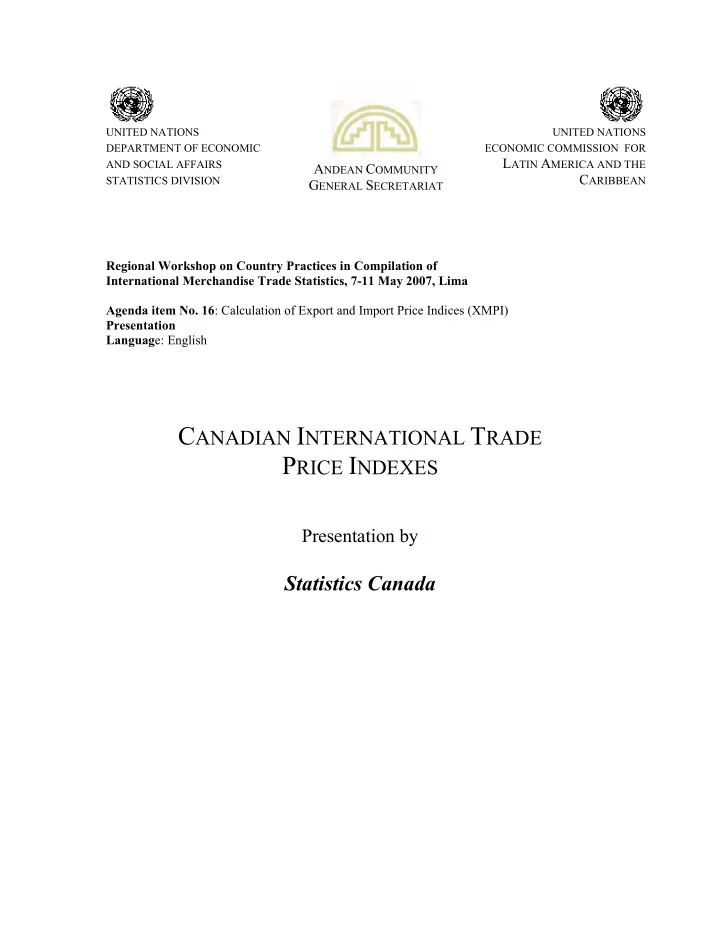

UNITED NATIONS UNITED NATIONS DEPARTMENT OF ECONOMIC ECONOMIC COMMISSION FOR AND SOCIAL AFFAIRS L ATIN A MERICA AND THE A NDEAN C OMMUNITY STATISTICS DIVISION C ARIBBEAN G ENERAL S ECRETARIAT Regional Workshop on Country Practices in Compilation of International Merchandise Trade Statistics, 7-11 May 2007, Lima Agenda item No. 16 : Calculation of Export and Import Price Indices (XMPI) Presentation Languag e: English C ANADIAN I NTERNATIONAL T RADE P RICE I NDEXES Presentation by Statistics Canada
- 2 -
Canadian International Trade Price Indexes Monthly price index (MPI) Canadian international trade � In 2006 – 80% of Canadian Exports were to the USA – Machinery, equipment and Automobile products accounted for 50% of Canadian exports – Energy accounted for 8% – 65% of Canadian Imports came from the USA – Machinery, equipment and Automobile products accounted for 58% of imports. 1
Source of price relative Export Import Direct measure Unit Value 45% 18% By survey 21% 11% Indirect measure CDN Domestic index 33% Foreign(USBLS) 1% 71% Advantages of current method � Done with a very small number of people and resources. � Modest response burden on Canadian companies 2
Disadvantages of current method – Partial measure of “real Canadian trade price” since a large portion of the trade is deflated with foreign indexes. – No real measure of exchange rate effect. – Unit Values are calculated using the definition of detail HS which are often heterogeneous . The new economic picture � Trade has gone from 25% of GDP in the seventies to around 40% presently. � The absolute yearly change in the US Canada exchange rate went from 2.6% in the 1970’s to a current level of 6.2%. � Significant change in the composition of goods traded . 3
Solution � Implement a survey of Canadian importers to replace foreign indexes. � Increase the number of export prices obtained by survey. – Due to budget limitation machinery and equipment goods will be targeted. Issues � It is much more costly in terms of: – Need a comprehensive list of importers and exporters – Infrastructure to collect the data – System to process the data – Need more analysts. – Increases the response burden on Canadian companies. 4
Strengths of the new survey � Real measure of Canadian trade. � Better measure of the effect of exchange on our trade. � Improvement of GDP deflation. � Stability of the goods description and possibility to make quality adjustments. Summary � In certain circumstances, unit value and foreign prices could represent an affordable and meaningful way to compile a trade index. � However, direct surveys give a much better quality index . 5
Contact information � About Statistics Canada: http://www.statcan.ca � About International Trade of Canada: trade@statcan.ca / commerce@statcan.ca � For prices: bernard.lupien@statcan.ca 6
Recommend
More recommend